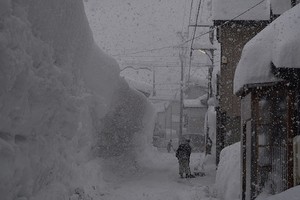November 24, 2021 at 13:26 JST
 A state crude oil storage facility in Higashikushira, Kagoshima Prefecture (Asahi Shimbun file photo)
A state crude oil storage facility in Higashikushira, Kagoshima Prefecture (Asahi Shimbun file photo)
To counter rising gasoline retail prices, the government has decided to provide subsidies to petroleum wholesalers as part of its "emergency COVID-19 economic relief measures," which are to be immediately implemented.
But is this the only recourse? We have our doubts.
Crude oil prices began rising this year when the pandemic slowed and the economy started recovering. Most recently, the nationwide average retail price of regular gasoline was close to 170 yen ($1.47) per liter, the highest in 13 years.
To prevent the steep price from negatively impacting the economy, the government will be providing petroleum distributors with subsidies of up to 5 yen a liter when the average retail price of regular gasoline tops 170 yen.
The subsidy will also apply to kerosene, light oil and heavy oil, and remain in place from late December through the end of March.
As a countermeasure against soaring gasoline prices, a mechanism exists that enables the government to call off the special tax rate of the gasoline excise tax and reduce the tax by about 25 yen per liter.
However, this measure has remained frozen to date to secure funds for projects recovering from the Great East Japan Earthquake of March 11, 2011.
To activate this countermeasure requires a legal amendment, which will be time-consuming, and the Ministry of Economy, Trade and Industry (METI) is unwilling to go along.
But the subsidy program, METI explains, can be implemented swiftly by tapping into this fiscal year's contingency funds.
However, subsidizing the petroleum wholesalers will not directly lead to lower retail prices. Even though METI claims that the distributors will be bound by a contract to commit to reflecting the subsidies on their wholesale prices, it is the prerogative of individual retailers to set their own post-wholesale prices.
This is because petroleum wholesalers are forbidden by law to restrict the freedom of retailers.
METI intends to check retail prices at some 29,000 gas stations nationwide to see if they are lowering their prices. Even though this will cost a whopping 15 times more than the amount being spent now, its viability is not even guaranteed.
By the principle of a market economy, prices are determined by supply and demand. To control prices by increasing the supply, measures that can be considered include working in concert with other consumer nations to urge producer nations to raise their output and making use of crude oil reserves.
When the media reported last weekend that the government was considering releasing part of its crude oil reserves at state storage facilities, crude oil futures prices, which were then at a seven-year peak, started dropping rapidly.
Consideration should also be made for the fact that tapping into the crude oil stockpiles has so far been limited only to dire shortages on a post-March 11, 2011, scale. But it is possible to explore short-term arrangements in concert with other countries such as South Korea and the United States. (Prime Minister Fumio Kishida announced on Nov. 24 that the government decided to sell part of its oil reserves.)
Turning the focus onto users, it should suffice to beef up support measures for small-scale ocean fishing operators and transportation businesses with heavy fuel cost burdens as well as low-income people.
But even short-term measures for artificially curbing price hikes can delay the nation's transition into a carbon-free society. The introduction of carbon pricing to reduce emissions is something that must be considered.
Any government policy related to energy prices requires that sort of mid- to long-term vision.
--The Asahi Shimbun, Nov. 24




















A peek through the music industry’s curtain at the producers who harnessed social media to help their idols go global.
A series based on diplomatic documents declassified by Japan’s Foreign Ministry
Here is a collection of first-hand accounts by “hibakusha” atomic bomb survivors.
Cooking experts, chefs and others involved in the field of food introduce their special recipes intertwined with their paths in life.
A series about Japanese-Americans and their memories of World War II